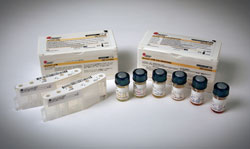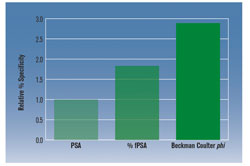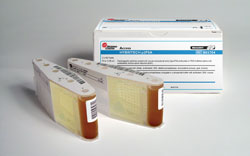BREA, CA USA (Press Release) - June 25, 2012
Beckman Coulter, Inc., the leader in prostate cancer diagnostics, announces Premarket Approval (PMA) from the U.S. Food and Drug Administration (FDA) for the Prostate Health Index (phi.), a simple, non-invasive blood test that is 2.5 times more specific in detecting prostate cancer1 than PSA (prostate-specific antigen) in patients with PSA values in the 4-10 ng/mL range and is proven to reduce the number of prostate biopsies.2
Beckman Coulter’s new test provides an answer to the current PSA testing controversy, where prostate cancer screening to save lives has been weighed against over-diagnosis and over-treatment. Last month, the U.S. Preventive Services Task Force (USPSTF) issued a statement indicating the need for "a better test and better treatment options.3"
"Prostate Health Index is a better test because it provides more accurate information physicians and patients need for better decision-making," said William Catalona, M.D., director of the Clinical Prostate Cancer Program at Northwestern University in Chicago and founder of the Urological Research Foundation. "Now, patients and physicians wondering what to do with an elevated PSA test result in the 4-10 ng/mL range have a new, non-invasive option. This represents an advance in the science of prostate cancer management."
The phi. test is indicated for use in men with a PSA in the range of 4-10 ng/mL.4 Typically, U.S. physicians recommend that men with a PSA in that range consider a prostate biopsy, however, an elevated PSA may be due to benign conditions other than cancer, which can lead to unnecessary biopsies. Prostate Health Index helps physicians distinguish prostate cancer from benign conditions. The results of phi.’s multi-center clinical study showed a 31 percent reduction in unnecessary biopsies.1
Kevin Slawin, M.D., phi. researcher and founder of the Vanguard Urologic Institute and the Texas Prostate Center at Memorial Hermann-Texas Medical Center added, "Now, with FDA approval in the U.S., phi. can help physicians discriminate between prostate cancer and benign disease while reducing the number of negative prostate biopsies."
Separately, results from a recent health economic study of phi. in the U.S. healthcare system suggests the test may help reduce costs associated with prostate cancer detection.2
"The Prostate Health Index is the result of years of collaboration with some of the world’s leading prostate cancer researchers and medical institutions who have studied the scientific, clinical and economic benefits of phi.," explained John Blackwood, vice president of Product Management, Beckman Coulter Diagnostics.
Available from Beckman Coulter in Europe since 2010, phi. will be available in the U.S. in the third quarter of 2012 for use on the company’s Access 2 and UniCel DxI immunoassay systems.
About Beckman Coulter
Beckman Coulter, Inc., based in Orange County, Calif., develops, manufactures and markets products that simplify, automate and innovate complex biomedical tests. More than 275,000 Beckman Coulter systems operate in both diagnostics and life sciences laboratories on six continents. For more than 75 years, our products have been making a difference in peoples’ lives by improving the productivity of medical professionals and scientists, supplying critical information for improving patient health and reducing the cost of care. For more information, visit www.beckmancoulter.com.
References:
- Beckman Coulter U.S. Prostate Cancer Pivotal Study Report
- Nichol MB, Wu J, Huang J, Denham D, Frencher SK, Jacobsen SJ. Cost-effectiveness of Prostate Health Index for prostate cancer detection. BJU Int. 2011 Nov 11. doi: 10.1111/j.1464-410X.2011.10751.x.
- www.uspreventiveservicestaskforce.org/prostatecancerscreening.htm
- Hybritech p2PSA Instructions For Use
[ PRESS RELEASE ]





